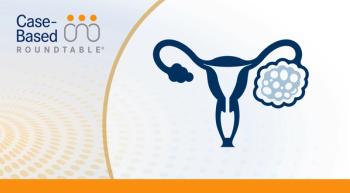
Investigational Mitomycin Gel Agents Demonstrate High CR Rates in Bladder Cancer Studies
The investigational agent UGN-101 induced a complete response in 59% of patients with low-grade upper tract urothelial cancer in the phase III OLYMPUS trial, according to findings from a final analysis of the pivotal trial.
Liz Barrett
The investigational agent UGN-101 induced a complete response (CR) in 59% of patients with low-grade upper tract urothelial cancer (LG UTUC) in the phase III OLYMPUS trial, according to findings from a final analysis of the pivotal trial. Interim findings were also released for UGN-102 in patients with intermediate-risk, low-grade nonmuscle invasive bladder cancer (LG NMIBC) from the phase IIb OPTIMA II trial.
UGN-101 in Low-Grade Upper Tract Urothelial Cancer
Follow-up is continuing in the OLYMPUS trial, but at 6 months, 89% had durability of their response and 84% at 12 months after primary disease evaluation.
The rolling submission of the New Drug Application (NDA) for UGN-101 is expected to be completed by the end of the year.
“We are pleased that the 6-month durability from this analysis remains consistent with previously presented results and are very pleased with the durability observed at 12 months in evaluated patients. These findings provide further support for the concept of chemoablation with UGN-101 as an initial kidney-sparing treatment option for patients with LG UTUC,” Liz Barrett, president and CEO of UroGen, the company developing UGN-101, said in a press release. “We are on track to complete our NDA to the FDA in Q4 2019 and will be prepared for anticipated approval and launch in 1H 2020 of the first drug for the non-surgical treatment of LG UTUC.”
UGN-101 (mitomycin gel) for instillation is a non-surgical treatment that is made of a hydrogel-based formulation of mitomycin that enables longer exposure of the urinary tract tissue to the treatment.
The pivotal, open-label, single-arm phase III OLYMPUS trial is evaluating UGN-101 for instillation in patients with LG UTUC (NCT02793128). Seventy-one patients were enrolled in the trial in clinical sites across the United States and Israel, assessing the safety and efficacy of the treatment.
Patients were treated with 6 weekly instillations of UGN-101, which was administered through a standard catheter, into the upper urinary system. About 5 weeks after the last instillation, patients underwent a primary disease evaluation, consisting of a ureteroscopy and wash cytology. Those who achieved a CR were then followed for up to 12 months.
Forty-one patients have entered follow-up after achieving a CR. The estimated median time to recurrence was 13.0 months.
Thirty-four patients included in the study were characterized by their physician as having endoscopically unresectable tumor at baseline; 20 of these patients achieved a CR as of the primary disease evaluation.
The most common treatment-emergent adverse events observed were ureteral stenosis, urinary tract infection, hematuria, flank pain, dysuria, renal impairment, hydronephrosis, and frequency. Most of these events were transient and were considered to be mild to moderate. The most common grade 3 treatment-emergent adverse events included ureteral stenosis (8.5%) and hematuria, flank pain, and urinary tract infection (3% each); one grade 4 event of subdural hematoma was also reported.
Adverse events involving the renal/urinary tract were reported in 67% of patients which required a temporary ureteral stent placement in 50%, a long-term ureteral stent in 23%, and nephroureterectomy in 4%.
The rolling submission of the NDA began in December 2018, and the agent previously received an orphan drug, fast track, and breakthrough designation from the FDA for the treatment of patients with upper tract urothelial cancer.
UGN-102 in Low-Grade NonMuscle Invasive Bladder Cancer
UGN-102 (mitomycin gel) for instillation is being studied in patients with low-grade nonmuscle invasive bladder cancer who are at an intermediate risk of recurrence as a potential primary chemoablative therapy.
The OPTIMA II trial is an ongoing open-label, single-arm, multicenter phase IIb trial (NCT03558503) that has enrolled 62 patients who met one or two criteria, including multifocal disease, large tumors, and/or rapid rates of recurrence. The trial completed enrollment in September 2019, ahead of schedule.
Patients in the trial were given 6 weekly instillations of UGN-102 that was delivered to the urinary bladder through a standard intravesical catheter.
Of 32 evaluable patients as of the interim analysis, 63% achieved a CR.
The most common adverse events observed were dysuria, pollakiuria, fatigue, hematuria and urinary tract infection, which were considered to be mild or moderate and transient.
“Achieving our enrollment goal ahead of schedule is a testament to the enthusiasm and need for this type of innovative approach to treatment in LG NMIBC. ‘Intermediate risk’ patients experience what can be viewed as a form of surgical failure, and many undergo multiple surgical procedures, known as transurethral resection of bladder tumor [TURBT], to manage these recurrences. We are encouraged by the data observed in this tough-to-treat population for whom the standard of care is really not effective,” said Mark Schoenberg, MD, chief medical officer of UroGen, in a statement. “While OPTIMA II remains ongoing and a phase III study is anticipated, the results presented today further support our belief that UGN-102 has the potential to be an effective treatment option for this patient population of approximately 80,000, as there are no other options for these patients aside from repetitive surgical intervention. Based on literature, these patients have a high likelihood of recurrence at one year due to the chronicity of this disease, so we will continue to follow them and assess durability at 12 months.”
A pivotal phase III trial is expected to be initiated in 2020 investigating UGN-102 in this patient population.
Reference:
UroGen Reports Positive Data from Two Important Studies: UGN-101 OLYMPUS Pivotal Trial in LG UTUC and UGN-102 Phase 2b OPTIMA II Trial in LG Bladder Cancer [press release]. New York: UroGen Pharma Ltd.; September 24, 2019. https://bwnews.pr/2njHtUM. Accessed September 26, 2019.




















